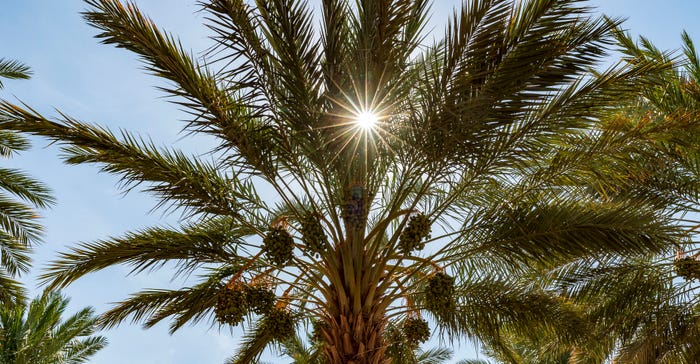
Dates grow well in the cloudless heat of the southern California and southwest Arizona deserts.Todd Fitchette
Dates continue to ripen as harvest begins about the end of August. The bags tied to the bunches of dates hanging from the trees were put up there in July to protect the maturing fruit.
The bags are chosen for their ability to shed water during summer thunderstorms and protect the crop from birds and bugs, according to Dave Mansheim, manager of Bard Date Company in Yuma, Ariz.
Dates are a labor-intensive crop. Crews will use lifts several times a year to manage and harvest the crop.
In mid-July, crews employed by Bard Date Company were busy tying branches that held maturing date bundles to an adjoining branch because the weight can become too much for a single branch. Once that job is complete, crews will return later to add bags to the bundles. At first the bags are simply draped over the top of the bundles of maturing fruit. Crews will return once again to tie off the bundles as the fruit begins to build sugar to keep birds and insects from damaging the fruit.
"We'll start harvesting the last week of August," Mansheim said. "It really gets into full swing the first part of September. By the end of October we'll be done."
Processing the dates is done locally.
Two main varieties of dates are grown in the region. The large Medjool date is a fresh market piece of fruit. The Deglet Noor is somewhat smaller and lends itself better for mechanical processing and tends to be found in trail mix products.
California grows the bulk of the U.S. date crop. Riverside and Imperial counties make up nearly all the state's production of about 30,000 tons, based on 2018 figures from the California Department of Food and Agriculture. That year the state's crop was valued at over $86 million.
A much smaller segment of the U.S. crop is grown in southwest Arizona, along the Colorado River, which serves as the natural border between California and Arizona.
About the Author(s)
You May Also Like






